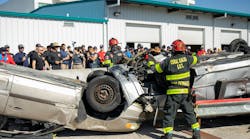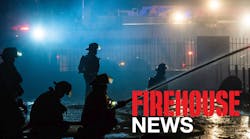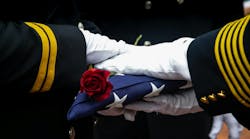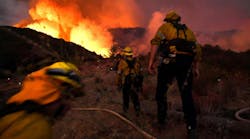Even if your department does background checks, you need to do more than just check for entry level test scores, work history and driving record.According to a recent NFPA report, "Regard for firefighters in the U.S. is at an all time high. In fact, in a recent survey, Americans gave firefighters the highest marks for honesty and ethics, above all other professions." In today's corporate climate of scandals (think Worldcom, Enron and Martha Stewart), are fire service leaders doing all they can do to protect the high level of trust the public has bestowed on our profession? What can a fire service leader do to safeguard this level of trust? One answer is to ensure that the department's hiring process does not let an unethical individual slip through the cracks.
Many fire department screen candidates through background checks. Most departments would exclude someone with a criminal conviction history, history of drug abuse or positive drug screen. You might even pass them over for a poor driving record. However, do you screen your candidates for ethical behavior?
One of the very first fire calls I responded to as a 21-year old rookie was to a jewelry store. There was heavy smoke in the building and the customers and employees had fled in a hurry. Expensive jewelry items and watches were everywhere. Not once did it cross my mind to pocket something. Fire fighters were all over the store, and not one item of jewelry was touched.
The public entrusts us with protecting their homes and valuables, and most fire fighters do not violate that trust. But, what do we do as fire service leaders to protect that trust?
Even if your department does background checks, you need to do more than just check for entry level test scores, work history and driving record. You need to check for honesty, integrity and ethics before you pin a badge on someone and make them a fire fighter. The rookie fire fighter hired today may rise through the ranks to higher levels of authority and responsibility. It is better to eliminate a candidate with unethical tendencies than to hire that person and have them ascend to a position of authority and responsibility.
How can you protect your department against unethical behavior?
First, make sure that ethical behavior is part of your department's corporate culture. Does your department's vision statement contain something about ethics? Do all of the senior officers share the same ethical values? Does your department have a standard operating procedure or policy that address ethical expectations?
Second, fire service leaders must set the example for the department. Is it ethical to accept free food from the local restaurant? Is it ethical to cover for your buddy on the other shift who ran 10 minutes late? Is it ethical to leave something broken and then try and blame it on the other shift the next work day? Is it ethical to discuss confidential patient information from a "really good EMS call" with co-workers from another shift? Is it ethical for an officer to overlook an incidence of on-scene freelancing if no harm was done? Answer these questions by the example you set for others in your behavior.
Third, include ethics training in the department's training program. Training topics on fire inspections, for example, can include ethics related topics.
Finally, don't hire ethical problems. Ethical behavior cannot be determined from a r?sum?. Here are several methods to use when interviewing candidates.
Revise the interview process to include behavioral event questions that cover behavior in past situations. Along with standard questions such as "Why do you want to be a fire fighter? and What are your strengths and weaknesses?" ask questions such as "Have you ever been asked to do something that you felt uncomfortable doing? How did you handle the situation?" Another question is. "Give me an example of a situation where you disagreed with your supervisor. How did you handle the situation?" You want to look for the candidate' response to ethical gray areas.
To evaluate a candidate's attitude the interviewer can say, "Describe the values you were taught and how they support your work ethic." Another question to assess attitude and communication skills is, "Give me a specific example of a time when a co-worker critized your work in front of others. How did you respond? How has that event shaped the way you communicate with others?" Another question to assess the ethical approach to solving interpersonal problems is, "Tell me about a time when you worked on a team or a project and a team member did not pull his own weight. What did you do? What did you learn?"
Behavioral event questions reveal what a candidate did, not what he or she would do in a hypothetical situation.
Hypothetical event questions can indicate ethical thinking and problem solving ability. An example of a hypothetical event question is; "You have just completed an inspection of a business and found many code violations. You are alone in the manager's office telling him to correct these violations and the owner says, 'I really can't fix these problems now, is there anything you can do to help me? Think about it while I step out and take a phone call.'" As he leaves the office, he puts a $100 bill on his desk in front of you. What would you do?
Ask questions about claimed credentials. If a candidate lists a specific skill, ask a question such as, "I see on your r?sum? that you are a hazardous materials response technician. Tell me about an incident that challenged your Hazmat skills." Follow up on the answer by asking more questions based on the candidate's answer. Confirm statements or claims made during the interview by contacting references or previous employers. Legitimate candidates will not become defensive when asked probing questions about a claimed credential, and the interviewer should be suspicious of those candidates who become defensive.
Use the STAR technique when asking behavioral event questions. The components of the STAR technique are: What was the Situation in which you were involved? What was the Task you needed to accomplish? What Action(s) did you take? What Results did you achieve? Focusing on these four components lets the interviewer drill-down and probe the candidate for potential ethical problems.
Ethics is just as important in the public sector as in the private. The public places a high level of trust in the fire service. Ethical behavior cannot be forced but it can be modeled. Be proactive and protect your department by developing, establishing and enacting integrity based operating practices. Your department will become stronger as a result.
Dennis Wolf is the chief of the Germantown, Tennessee, Fire Department. Dennis holds a bachelor's degree in fire administration from the Universityof Memphis. He has the Chief Fire Officer Designation (CFO) through the Commission on Fire Accreditation International and holds the grade of Member (MIFireE) in the Institution of Fire Engineers. Chief Wolf can be reached at: [email protected]





